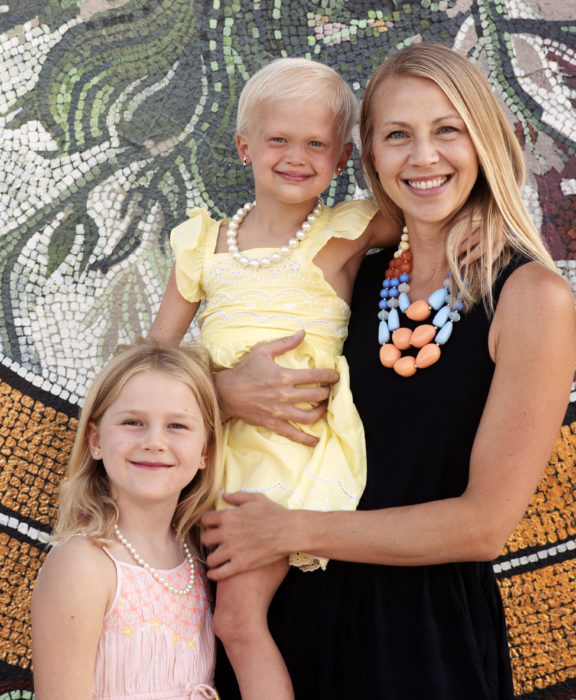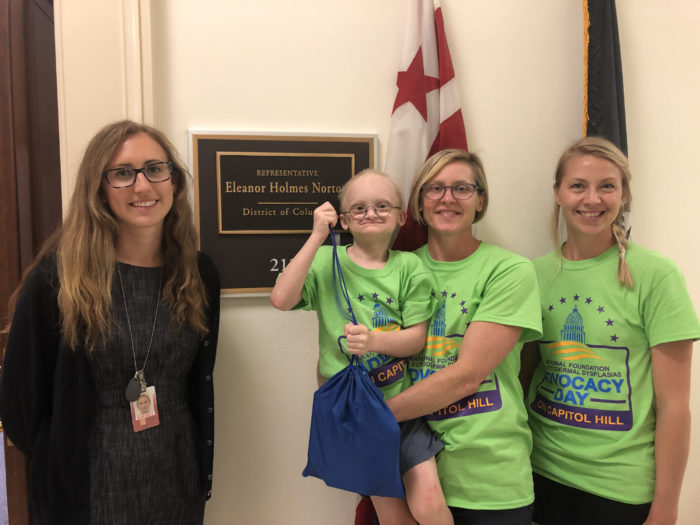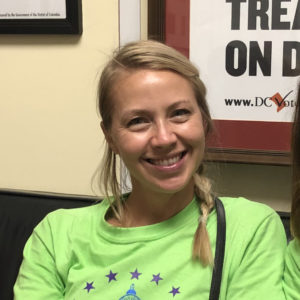Hello NFED families,
My name is Samantha Mueller and my daughter, Kira, was born with hypohidrotic ectodermal dysplasia. She has no teeth, very little hair, cannot sweat, plus she has the typical dry nose, ears and skin.

I have been an active family advocate since 2018, and it fuels my sense of purpose to fight on behalf of Kira and all individuals and families affected with ectodermal dysplasias.

I hope you are all feeling incredibly positive and optimistic after the National Foundation for Ectodermal Dysplasias (NFED) Advocacy Day on Capitol Hill on April 28. What an inspiring day for our families. Although we have been continuing to receive additional co-sponsors from that important day, we must not lose the momentum from our family advocates.
Advocacy Day is only the beginning and the 117th Congress is our chance to get the Ensuring Lasting Smiles Act (ELSA) passed. We know this takes some time and effort, so we encourage you to ask friends and family to support you on this journey. The NFED website has a tremendous amount of information available to support you in advocating.
Here are some personal tips from my advocacy journey.
- Get personal when writing your story. The most impactful storytelling is what can make the difference. Identify yourself as a constituent. Communicate to your legislators about what your family has been going through. Help them to understand why this bill is so important. And give them a clear call-to-action.
- Ask your friends and family to get involved. You don’t need to be personally impacted to be able to ask for support with ELSA. You have family and friends who love you. Ask for their help. It takes a village.
- Be politely persistent with getting meetings scheduled. Continue to reach out to your legislators’ offices until you get a meeting scheduled. Many local offices are starting to schedule in-person meetings again. Look for upcoming town halls that your legislator will be hosting.
- Involve your children. My 5-year-old daughter has been one of the most impactful efforts as I have attended these meetings. She has been welcomed into Washington D.C. and local offices.
- Show your legislators the list of professional and patient organizations that support this bill. Help them understand that these procedures for repair and restoration of congenital anomalies or birth defects are often incorrectly categorized, delayed or denied.
- Dedicate the time. Make the space for this incredibly important effort. Take a vacation day if you can. Look into if your organization supports time off for volunteering.
- Use your network. Post on your social channels with a direct link to the advocacy tool; encourage people to write to their legislators and reinforce it only takes two minutes. Post on LinkedIn. I received as much support on LinkedIn during Advocacy Day as I did on Facebook, with a completely different network. People want to help people.
- Ask your medical and dental providers to support the legislation. Have the advocacy tool up on your phone and ask them to write to legislators during your appointments.
- Consider reaching out to local media for coverage. You can write letters to the editors, or submit op-eds. You can also contact local reporters to share your personal story. Relevant media coverage could then be shared with elected officials from your community or state.
- Ask questions or ask for help. Becky Abbott and Kevin Koser, co-chairs of the NFED’s Family-Driven Advocacy Committee, are available to help you with any advocacy needs. Also, leverage your State Advocacy Lead for support.
- Don’t be worried about having it perfect. Remember, our legislators work for us, and they are here to help constituents. The only way we don’t get this passed is to stay silent. Let’s make our voices be heard! Your voice has power. Your voice matters.
You can get started with the helpful resources available right now:
- ELSA Overview
- Meeting Your Legislators Close to Home
- Preparing for an Advocacy Meeting
- The Advocacy Tool & State Leads
- How to Tell Your Advocacy Story
Samantha Mueller is a guest blogger and advocate for the NFED. She live in Colorado with her two daughters.
